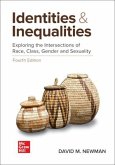Now in its 19th edition, Cultural Anthropology: Appreciating Cultural Diversity is an introduction to sociocultural anthropology, also covering linguistic and applied anthropology. While presenting cultural anthropology's core concepts and topics, the text also aims to demonstrate anthropology's relevance to the 21st-century world we inhabit. The subtitle of the text reflects its goal of instilling a sense of appreciation: (1) of cultural diversity, (2) of cultural anthropology as a field, and (3) of how an anthropological approach can build on, and help make sense of, the experience that students bring to the classroom.








